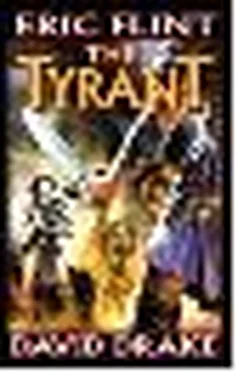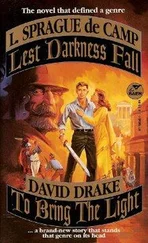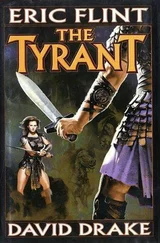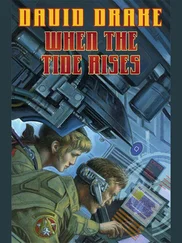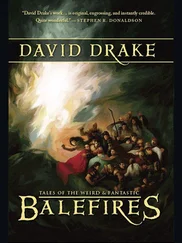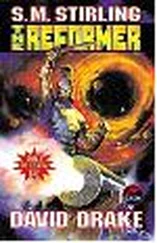David Drake - Tyrant
Здесь есть возможность читать онлайн «David Drake - Tyrant» весь текст электронной книги совершенно бесплатно (целиком полную версию без сокращений). В некоторых случаях можно слушать аудио, скачать через торрент в формате fb2 и присутствует краткое содержание. Жанр: Боевая фантастика, на английском языке. Описание произведения, (предисловие) а так же отзывы посетителей доступны на портале библиотеки ЛибКат.
- Название:Tyrant
- Автор:
- Жанр:
- Год:неизвестен
- ISBN:нет данных
- Рейтинг книги:5 / 5. Голосов: 1
-
Избранное:Добавить в избранное
- Отзывы:
-
Ваша оценка:
- 100
- 1
- 2
- 3
- 4
- 5
Tyrant: краткое содержание, описание и аннотация
Предлагаем к чтению аннотацию, описание, краткое содержание или предисловие (зависит от того, что написал сам автор книги «Tyrant»). Если вы не нашли необходимую информацию о книге — напишите в комментариях, мы постараемся отыскать её.
Tyrant — читать онлайн бесплатно полную книгу (весь текст) целиком
Ниже представлен текст книги, разбитый по страницам. Система сохранения места последней прочитанной страницы, позволяет с удобством читать онлайн бесплатно книгу «Tyrant», без необходимости каждый раз заново искать на чём Вы остановились. Поставьте закладку, и сможете в любой момент перейти на страницу, на которой закончили чтение.
Интервал:
Закладка:
Adrian translated, leaving out certain unnecessary passages involving female animals and hunting.
" 'Lust for the matrons'?" she puzzled. "What does that mean?"
Adrian scratched his head. "I'm not sure myself." Inwardly: Raj? Center?
After a moment, Whitehall's voice came . Interesting. Center, what was the name of that king? The one from that country named France, I think. Henry this or that. Said something—
paris is worth a mass.
* * *
The march to the sea was a nightmare. Not dangerous, particularly, for such a large and well-organized and well-armed group of men — except for the ever-present dangers of hunger and disease. Just hideous.
The barbarian invasion had ravaged the southern provinces, saving only the larger walled towns. Then, and in many ways even worse, the rebellions and slave revolts which erupted throughout the southern Confederacy after Tomsien's disaster at Lurion ravaged them further. Landowners and nobles often escaped the barbarian bands roaming the countryside haphazardly. It was much harder for them to escape their own infuriated underlings, who not only knew where they lived but had a personal grudge to settle. The landscape across which Adrian and Helga and their little army marched was dotted with the burned shells of noble villas and estates — and, not infrequently, the corpses of their former owners. Who, as often as not, had been put to death in a manner whose gruesomeness would have shaken the most barbarous Southron warrior.
Nor were slaves and landless laborers the only ones with grudges to settle. After decades of increasingly extortive and corrupt rule, the Confederation was a crazy quilt of hatreds and resentments. All of which seemed to boil over at once.
Tax farmers suffered even worse casualties than landowners. If for no other reason than because the wealthiest landholders tended to be absentee owners. Their country estates could be put to the torch, but they themselves were safe — for the moment at least — behind the walls of Vanbert or the other great cities. Whereas, in the nature of things, a tax farmer needs to live close to his "crop." When the long-simmering eruption took place, tax farmers were much in the same position as a peasant standing in a field of corn — every one of whose stalks was suddenly alive, armed, and filled with bitter memories of the fate of their predecessors.
Grudges, hatreds, resentments — everywhere. In the towns, the garrisons were usually able to maintain order. Enough to suppress any major uprisings, at least, even if they could not prevent the multitude of small homicides and beatings which took place constantly. The garrisons could keep the masses from storming into the central squares; they could not possibly keep those same masses, scattered in small bands, from looting the shops and (often enough) maiming or killing the proprietors. Any money lender or pawnbroker who did not make it to the garrison barracks within a day after the news of Lurion spread was unlikely to survive another.
In the countryside, where nine out of ten members of the Confederacy still lived in the less urbanized southern provinces, the garrisons did not even attempt to maintain order. Not loyal ones, at least. Garrisons which rebelled, ironically enough, often did establish a certain rough "order" within the immediate region. They had to, if they were to survive themselves. A loyal regiment can expect, even if vainly, to get pay and provisions from the central authorities. Mutineers must look for their own pay.
It was sheer chaos, except for little islands and pockets of stability here and there. For the most part, outside the towns, those pockets were provided by resettled veterans. Clusters of villages, much like the ones which Jessep and his clanfolk had established on Demansk's lands. Largely populated by transplanted easterners, whose close kin ties and military experience enabled them to clamp a fist on their immediate terrain.
Invariably, such villages drove off the bands of runaway slaves which were soon roaming the countryside. Taken as a mass, those slaves probably did more damage than anything else. Not so much out of vindictiveness, once they'd settled accounts with their own masters, but simply out of desperation. A group of slaves who rise up and murder a master or burn down his estate — or both — has but one thought afterward: flee, before the reprisal comes.
They had no way of knowing, of course, that there was not much chance of any reprisal coming. Not soon, at least. Isolated as they were, field slaves had little understanding of the great world of Confederate politics. The one thing they did know for sure — branded into them over the decades with lash and stake and spear — was that any rebellion against Vanbert masters would invariably bring a quick and merciless response.
So, they fled. Immediately, and with no thought at all for how they would survive the days and weeks and months ahead. Half-naked, most of them, without food; autumn here, and winter coming.
Vanbert winters were "mild," true enough — by the standards of a nobleman in his villa, or even a yeoman farmer in his cottage. For a half-naked, starving slave on the run, it is always winter. "Summer" is simply that portion of winter when you might survive a little longer.
Almost every slave plantation and estate in that third of the Confederacy called the "southern provinces" erupted, within a week after Lurion. It might be better to say "burst" — like a sudden ulcerous wound, spilling toxins within the body politic. Tens and tens of thousands of slaves roaming everywhere, like so many locusts. Except these locusts had hands; and brains, which, however uneducated, were no less shrewd than any other human brain. They plundered where they could; robbed where they couldn't; thieved at all times.
They had no choice, whatever their own inclinations might have been. There was no work. The estates were shattered, the towns were closed, and the villages of freemen attacked them on sight. If the villagers were transplanted easterners, the attacks would be carried through with pogromist fury. Easterners hated slavery, because it had ruined them — and, as is almost always the case in history, made no sharp distinction between the slaveowner and the slave. Except that it's usually a lot easier to lynch a slave.
Every day, Adrian and Helga's army marched through horror. Ruin and destruction everywhere. Rich farmlands now watered with blood; and a fruitless watering, to boot, because the crops in the fields were either ruined or left untended.
Helga was aghast. It was like seeing an entire nation subjected to gang-rape.
" This is what Father wanted?" she wept, one day. "And you also?"
There was no way to answer, really. Explain, certainly — that Adrian could have done at length, and with all of Center's encyclopedic knowledge of human history to document his argument. But answer ?
He settled on the simple truth. "Yes," he said. "This is what we wanted. Because a boil cannot heal until it is lanced. A long-gaping, cankerous wound cannot close until it is cauterized."
She avoided him for days thereafter, insofar as she could in the cramped quarters of the marching column and the field camps. Until, three weeks after the march began, the column came over the crest of a hill and saw the sea beyond. The sea and, standing like a burnt shell before it, what had once been the great western villa of the family Demansk.
The ruined villa seemed to steady Helga. As if she found comfort in the fact that, whatever else, her father had not spared himself from the bleeding. And then, steadiness shifted into hope, as she saw that Trae's villa and the workshop on their side of the river was still standing and intact.
Читать дальшеИнтервал:
Закладка:
Похожие книги на «Tyrant»
Представляем Вашему вниманию похожие книги на «Tyrant» списком для выбора. Мы отобрали схожую по названию и смыслу литературу в надежде предоставить читателям больше вариантов отыскать новые, интересные, ещё непрочитанные произведения.
Обсуждение, отзывы о книге «Tyrant» и просто собственные мнения читателей. Оставьте ваши комментарии, напишите, что Вы думаете о произведении, его смысле или главных героях. Укажите что конкретно понравилось, а что нет, и почему Вы так считаете.
